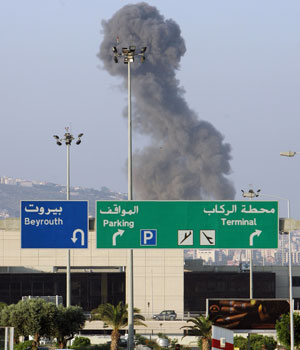
Smoke billows from the Rafik Hariri International Airport in Beirut following Israeli air strikes, 13 July 2006 (AFP)
BEIRUT, (Reuters) – Israel struck Beirut airport again on Friday and bombed Lebanese roads, power supplies and communication networks in a widening campaign after Hezbollah guerrillas seized two Israeli soldiers and killed eight.
Hezbollah, which wants to trade its captives for prisoners held in Israel, has showered rockets across the frontier in its fiercest bombardment since 1996 when Israel launched a 17-day blitz against southern Lebanon and Hezbollah.
Israeli aircraft rocketed runways at Beirut’s international airport and bombed a flyover just to the south, witnesses said.
The airport has been shut since Israeli air strikes hit runways and set fuel tanks ablaze on Thursday. Four planes of Lebanon’s Middle East Airlines had taken off empty for Amman shortly before the latest raid.
Israeli warplanes blasted the main Beirut-Damascus highway overnight, tightening an air, sea and land blockade of Lebanon, and bombed targets in Beirut’s teeming Shi’ite Muslim suburbs, killing three people and wounding 40, security sources said.
Their deaths brought to 60 the number of people, almost all civilians, killed in Lebanon since Israel’s campaign began.
The Israeli military said Hezbollah had fired more than 130 missiles into Israel in 48 hours, killing two civilians and wounding over 100.
It said Hezbollah’s main security compound in southern Beirut had been among targets hit on Friday. Reuters reporters said they could see no sign of damage at the site.
Black smoke billowed from a burning fuel depot at the Jiyyeh power plant south of Beirut as Israeli ships shelled the nearby coastal road, witnesses said. Air raids targeted several mobile telephone relay stations in eastern Lebanon.
Israeli jets also struck a pro-Syrian Palestinian guerrilla base in eastern Lebanon. No casualties were reported.
Israel holds Lebanon responsible for the actions of Hezbollah, a Syrian- and Iranian-backed Islamist group which has members in parliament and in the mainly anti-Syrian cabinet.
The fragile Beirut government, too divided to disarm the Shi’ite faction that effectively controls south Lebanon, has urged the U.N. Security Council to call on Israel to halt its onslaught when the top world body meets later on Friday.
But Israeli Prime Minister Ehud Olmert and his security chiefs opted on Thursday evening to ramp up the bombardment.
That followed two unprecedented missile strikes on the port of Haifa, blamed by Israel on Hezbollah, which denied it had fired on the city, 30 km (18 miles) from the Lebanese border.
No one was hurt in the attack.
The violence in Lebanon coincided with an Israeli incursion into the Gaza Strip launched last month to try to retrieve another captured soldier and halt Palestinian rocket fire.
The army said on Friday it had pulled out of the central Gaza Strip, which it entered as part of the offensive. It said its forces had targeted an office of the ruling Hamas militant group in the northern Gaza Strip and a bridge overnight.
Troops fired a tank shell at a vehicle, killing a Palestinian and wounding another, medics said. Israel has killed more than 80 Palestinians during the offensive.
Fearing a prolonged Israeli-Hezbollah confrontation, Lebanese queued for petrol and hoarded food and drink. Power rationing began and many shops and offices stayed shut.
The crisis has helped drive world oil prices to record highs and has shaken financial markets in Israel and Lebanon.
Beirut’s bourse temporarily cut the limits within which share and bond prices can fluctuate to five percent from 10 percent. The Israeli shekel slipped further against the dollar and has now fallen more than three percent in the past three days.
Israeli planes dropped leaflets in Beirut suburbs and some southern cities urging residents to stay away from Hezbollah offices, fuelling speculation that the group’s charismatic leader, Sayyed Hassan Nasrallah, could be targeted.
U.S. President George W. Bush has said Israel has the right to defend itself, but should not weaken the Lebanese government. Secretary of State Condoleezza Rice urged Israel to exercise restraint and demanded that Syria rein in Hezbollah.
Syria’s ambassador to the United States said Washington should restrain Israel and push for renewed peace talks.
Iran’s President Mahmoud Ahmadinejad said any Israeli attack on Syria would draw a fierce response from the Islamic world. The European Union and Russia have criticised Israel’s strikes in Lebanon as disproportionate.

Syrian citizens with their belongings rush to leave after Israel strikes Hezbollah’s stronghold in southern Beirut, Lebanon, 14 July 2006 (EPA)

A man holding the Hezbollah flag inspects a bridge that was knocked down when Israeli air raids targeted it, in the suburbs of Beirut, Lebanon, July 14, 2006 (AP)
